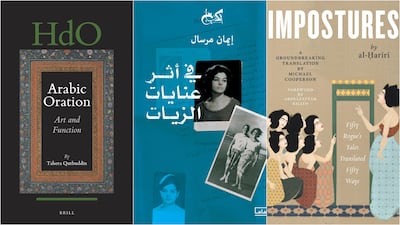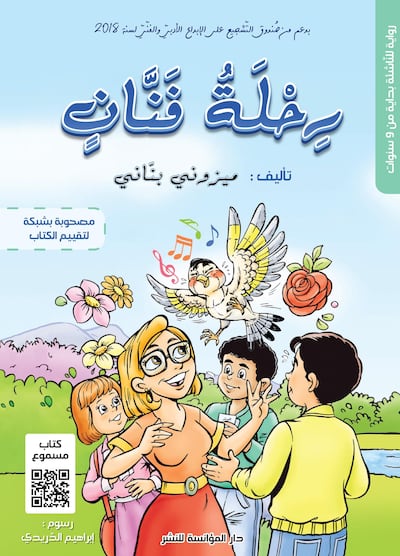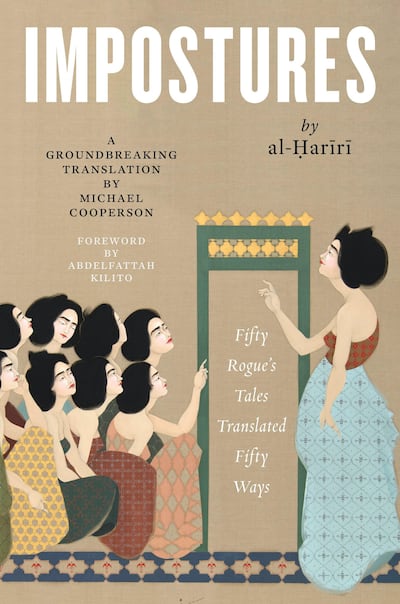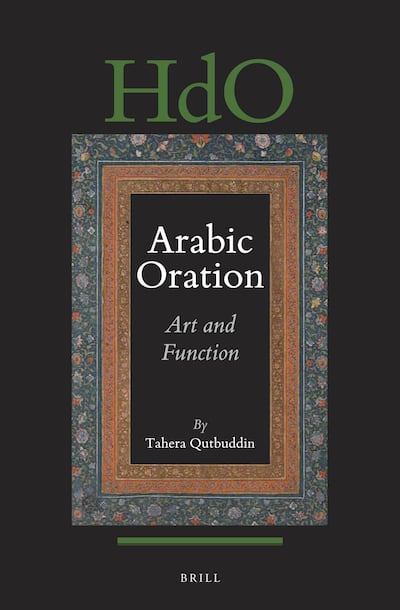Seven authors and researchers from Egypt, Tunisia, Saudi Arabia and the US, as well as a publishing house from Lebanon, have been declared the winners of this year's Sheikh Zayed Book Award.
The winners will be formally awarded in a virtual ceremony ahead of the Abu Dhabi International Book Fair in May. They will each receive a gold medal, certificate of merit and a cash prize of Dh750,000.
The winners were selected from a pool of more than 2,300 submissions, the most the annual award has received since it was founded in 2007.
The winners
Egyptian writer Iman Mersal's novel Fee Athar Enayat Al Zayyat (In the Footsteps of Enayat Al Zayyat) nabbed the Literature Award. The work follows the narrator's efforts to uncover the reasons behind the mysterious suicide of the Egyptian writer Enayat Al Zayyat. Blending narrative prose with investigative journalism and academic research, the book provides a balanced, critical look at Al Zayyat's life and writing.
The novel – published in 2019 by Al Kotob Khan Library – has been described by Egyptian writer Ahmad Jamal Saadeddine as “a rare experiment in the Arabic language".
Rehlat Fannan (An Artist's Journey) by Tunisian author Mizouni Bannani won the Children's Literature Award. Published by Dar Al Mua'nasa Publishing in 2020, the work confronts several topical and pertinent themes related to immigration and the role of an artist in society. The book, rich in imagery and metaphor, highlights the importance of practising the arts to hone empathy and develop a functional society.

The Young Author Award was given to Saudi Arabian researcher Dr Asma Muqbil Awad Alahmadi. Her study of literary criticism – Eshkalyat Al Thaat Al Saredah Fee Al Rwayah Al Nesaayah Al Saudiah (The Problems of the Narrated Self in the Saudi Feminist Novel) – examines novels written in Saudi Arabia between 1999 and 2012. The work highlights the rise of the female novel during this period and exploring such works' themes, which include identity, belonging and women's struggle for self-realisation.
The study also enumerates the challenges and difficulties female authors face on an artistic, literary and social level. The 800-page work was published by the Arab Scientific Publishers Inc in 2020.
An English translation of Al-Hariri's Impostures by US author Michael Cooperson won the Translation Award.
Originally written by the Arab poet in the 12th century, the work is known to be notoriously challenging to translate because of the way it incorporates a medley of linguistic styles, rhymed narratives and idiomatic language.
The work follows the shady adventures of Abu Zayd around the medieval Middle East, taking readers on a wild ride as he impersonates a preacher, pretends to be blind and lies to a judge.
Just as Al-Hariri made use of the disparate styles and idioms of the Arabic language of his time to tell al Saruji's story, Cooperson adopts a buoyant approach to the English language in his translation, Impostures. He avoids a literal translation in favour of one that transmits the sentiments, ideas and expressions of the original work.
Meanwhile, Masar Al Tahdeeth fe Al Fonoon Al Tashkelyah, men Al Orsomah ella Al Lawha (The Path of Modernisation in the Visual Arts, From Drawing to Painting) by Tunisian researcher Khelil Gouia won the Literary and Art Criticism Award. The book is an exploration of Tunisian art history from the emergence of Ursooma, a form of Islamic art involving painting on glass, all the way to painting in the contemporary sense of the word, which emerged in the early 20th century.
Turath Al Iste'ela'a bayn Al Folklor wa Al Majal Al Deeny (Legacy of Supremacy between Folklore and Religion) by Saeed El-masry won the Contribution to the Development of Nations award.
A 357-page, seven-chapter cultural anthropology that combines theory and field research, this book discusses religion and folklore, stopping to address a concept with heavy social connotations: arrogance. The author traces the roots of this phenomenon in folklore, as well as in political Islamic groups that have stoked the spirit of arrogance in a manner that has contributed to the spread of extremism. The book also explains cultural discrimination in Egyptian folklore, as well as traditional forms of discrimination based on social status, age, residence, race and appearance.
The Arab Culture in Other Languages Award was given to Tahera Qutbuddin for her work Arabic Oration: Art and Function.
With illustrative texts and original translations, the work explores how religion, politics and aesthetics consolidated the foundations of the art of Arabic oration in the early Islamic world.
The work, published by Brill in 2019, contains speeches and sermons from the 7th century onwards, attributed to the Prophet Mohammed, political and military leaders, as well as several prominent women. Qutbuddin examines the various structures, styles and themes in early oral works, studying orator-audience authority dynamics.
Finally, Beirut’s Dar Al Jadeed won the Publishing and Technology Award. The publishing house was praised for focusing on long-forgotten topics in Arab publishing, as well as science books and linguistic and intellectual studies.
The recipient of the Cultural Personality of the Year award will be announced in the coming weeks, ahead of the virtual ceremony for the 15th Sheikh Zayed Book Award. The Cultural Personality of the Year recipient will be presented with a gold medal and a certificate of merit, as well as a prize of Dh1 million.





